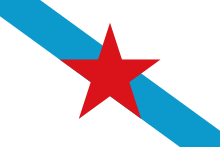
Galicia is an autonomous community of Spain and historic nationality under Spanish law. Located in the northwest Iberian Peninsula, it includes the provinces of A Coruña, Lugo, Ourense and Pontevedra.

The Galician Nationalist Bloc is a political alliance of left-wing Galician nationalist parties. It is self-defined as a "patriotic front".
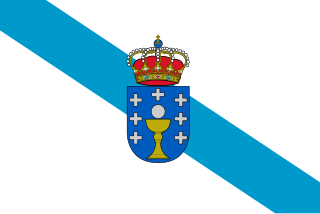
Dia Nacional de Galicia is when the autonomous community of Galicia in Spain celebrates its national holiday. It falls on 25 July.

Televisión de Galicia, commonly known as A Galega, is a Spanish free-to-air television channel owned and operated by Televisión de Galicia S.A., the television subsidiary of Galician regional-owned public broadcaster Corporación Radio e Televisión de Galicia (CRTVG). It is the corporation's flagship television channel, and is known for broadcasting mainstream and generalist programming, including Telexornal news bulletins, primetime drama and entertainment in Galician language.
Reintegrationism is the linguistic and cultural movement in Galicia which advocates for the unity of Galician and Portuguese as a single language. In other words, the movement postulates that Galician and Portuguese languages did not only share a common origin and literary tradition, but that they are in fact variants of the same language even today. According to this, Galicia should re-integrate into the Community of Portuguese Language Countries.

The Galicia national football team is the official football team of Galicia. It is organised by the Galician Football Federation. The team is not affiliated with FIFA or UEFA and is, therefore, only allowed to play friendly matches.
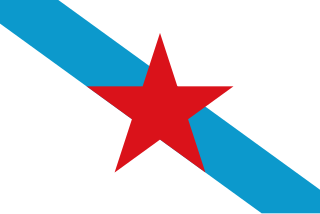
Galician nationalism is a form of nationalism found mostly in Galicia, which asserts that Galicians are a nation and that promotes the cultural unity of Galicians. The political movement referred to as modern Galician nationalism was born at the beginning of the twentieth century from the idea of Galicianism.
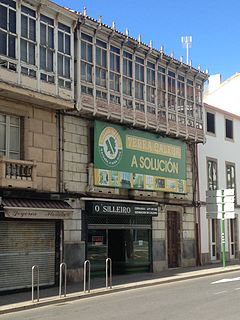
Terra Galega is a coalition of centrist and Galician nationalist political parties; it was established on November 4, 2005; but the name has been registered since May 2005.
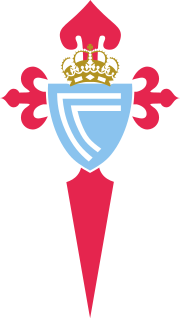
Real Club Celta de Vigo, commonly known as Celta de Vigo or simply Celta, is a Spanish professional football club based in Vigo, Galicia, that competes in La Liga, the top tier of Spanish football. Nicknamed Os Celestes, the club was founded on 1923 as Club Celta, following the merger of two Vigo-based teams. The club's home stadium is Balaídos, which seats 29,000 spectators.

Galician, also known as Gallego, is a Western Ibero-Romance language. Around 2.4 million people have at least some degree of competence in the language, mainly in Galicia, an autonomous community located in northwestern Spain, where it is co-official with Spanish. The language is also spoken in some border zones of the neighbouring Spanish regions of Asturias and Castile and León, as well as by Galician migrant communities in the rest of Spain, in Latin America including Puerto Rico, the United States, Switzerland and elsewhere in Europe.

The Corporación Radio e Televisión de Galicia (CRTVG) is the public broadcaster for the autonomous community of Galicia, Spain.
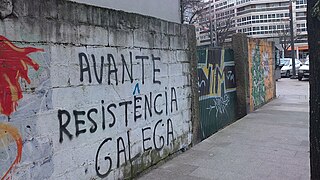
Resistência Galega, sometimes referred to as REGA, is the term used by a series of left-wing and Galician separatist organisations and individuals to claim attacks in Galicia. The term was first used in 2005 when a manifesto named Manifesto da Resistência Galega appeared on the Internet. Since then, Resistência Galega has carried out dozens of attacks against political party offices and banks across Galicia.

The culture of Galicia is the patterns of human activity and symbolism associated with the Galicia region of Spain and the Galician people.

Galiza Nova is the youth organisation of the Galician Nationalist Bloc, founded in 1988.
The Assembly of the United People (APU) was a Galician political organization, with an independentist, socialist and feminist ideology. It was formed in 1989 from a split of the first Galician People's Front, and disappeared with its self-dissolution in 1995.

Isca! is the name of a Galician youth organization that promotes Galician independence, combined with anti-capitalist and feminist ideology. They are linked to the Galician Movement for Socialism, a socialist and pro-independence party that forms part of the Galician Nationalist Bloc (BNG).

The Galician Movement for Socialism is a Galician communist, pro-independence and feminist organization. The MGS was born in March 2009, although its origins go back to the summer of 2006. The MGS works inside the Galician Nationalist Bloc and the Confederación Intersindical Galega.
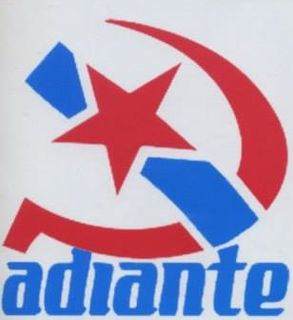
Adiante - Galician Revolutionary Youth was a youth organization in Galicia (Spain) with a Galician independentist and communist ideology. According to themselves Adiante was "an autonomous youth assembliary organization, that embraced the diversity of the Galician youth problems from the perspective of national and social liberation, with the strategic horizon the construction of an independent, socialist and feminist Galician Republic."

The Galician National-Popular Bloc was a Galician electoral candidacy. It had as the national sovereignty for Galiza as its main objective and as an alternative to autonomism. It was formed by the Galician People's Union (UPG) and Galician National-Popular Assembly (ANPG).
Galician Workers' Front is a Galician political organization. It was formed in 2010 by militants of the trade union world, mainly of the Confederación Intersindical Galega (CIG). The organization was integrated in the Galician Nationalist Bloc (BNG) until 2012, when the FOGA abandoned the BNG and was one of the three parties that formed Renewal–Nationalist Brotherhood.

